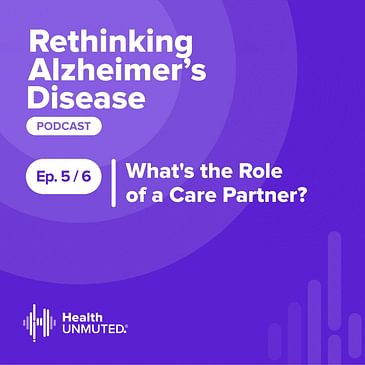Alzheimer’s disease doesn’t just affect the person who is diagnosed. It affects caregivers, too. So, if you care about someone with Alzheimer’s disease, this episode is for you.
In this episode of the "Rethinking Alzheimer's Disease" podcast, we hear from Laura, who shares the emotional journey of accepting her husband Andrew's early onset Alzheimer's diagnosis. This story opens up a discussion on the realities of Alzheimer's, not just for those diagnosed, but also for their caregivers, whether they are spouses, adult children, or even teenagers.
Dr. Joel Ebuh highlights the significant health and financial impacts on caregivers, underlining the disease's broader effects beyond the people with Alzheimer’s. Katie McDonough and Jason Resendez discuss the multifaceted role of caregivers, from providing emotional support to handling logistical challenges like treatment and medical appointments. They stress the importance of preparing for the future and the strain of uncertainty on caregivers. They also discuss the importance of caregiver self-care and why it is critical that care partners have support to manage this challenging journey effectively. We share some of the organizations and resources available.
The episode also touches on the stigma around Alzheimer's, the difficulty in initiating tough conversations such as taking away car keys, and the importance of advocating for both the patient and the caregiver's needs. Through personal stories from caregivers like Brandon Burke, who cared for his father diagnosed at 59, and expert advice from professionals like Dr. Mary Mittelman, this episode offers insights into coping mechanisms, the power of counseling, and the importance of community and support groups in navigating the complexities of Alzheimer's caregiving.
For links to resources and information covered in this series, visit our website at HealthUnmuted.com/resources
What did you think of this episode? We’d love to hear from you. Please visit healthunmuted.com/feedback to let us know!
Rethinking Alzheimer’s Disease was made possible with support from Eisai Inc.
[01:52] Confronting stigma and shame
[02:28] How to navigate care and emotional support?
[06:29] How to approach difficult conversations and adjustments?
[07:48] The importance of self-care for caregivers
[09:20] Utilizing community and online resources
[11:59] Enjoying life and making memories
Disclaimer: The content provided in this podcast is intended for informational purposes only. It is not a substitute for professional medical advice, diagnosis, or treatment. Always seek the advice of your physician or other qualified healthcare provider with any questions you may have regarding a medical condition. Never disregard professional medical advice or delay in seeking it because of something you have heard on this podcast. Reliance on any information provided by this podcast or its guests is solely at your own risk.
©2024 Mission Based Media Ltd • April 2024 • AD-M2059






